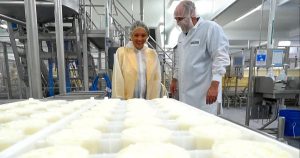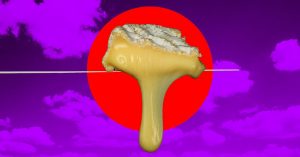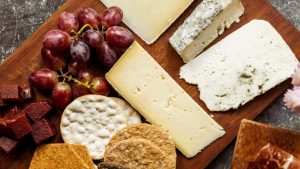
Milk literally flows directly into the artisanal cheese making operation.
Their clients include Whole Foods and The Inn at Perry Cabin and Piazza, and big-time distributors like Sysco, Metropolitan and Saville Foods.
“My husband and I moved down here in 2017. We are third-generation dairy farmers from Pennsylvania. We are fairly new to cheesemaking. We had a professional consultant help teach us and guide us and get us started,” Trisha Boyce said.
Trisha and her husband run the farm together, and taking care of their 40 milking cows along with a creamery and an artisanal cheese making operation adds up to a lot of hard work.
“Cheesemaking is not for the faint of heart,” she said. “It’s a lot of heavy lifting, cleaning, scrubbing. But it is easier to find someone who wants to work inside all day than it is to find someone to help you outside, hard work outside with big animals. If it is monsooning out there you are still working. It is really making sure that they are taken care of to the fullest.”
“We are milking 40 cows now and we have probably 100 head total,” she said.
They even have a calf that was born yesterday that has a warm jacket on and gets bottle fed his mother’s milk. They are all named and registered, with names including Coco, Ozark, Mini and Spider, who was born on Halloween. The cows are milked for five minutes, twice a day.
The farmers try to manage their crops so that almost all of the cow’s feed comes from the farm. This is where Jarred comes in.
“[Jarred] is the best of the best at crop rotation and being efficient with our land. He is our feed man, our crop man and I do most of the raising,” Trisha said.
“Essentially I am their mother. So they know when it is me coming. It drives Jarred nuts because they are all ungodly friendly,” she said.
Some of their cows are raised for meat that are sold to restaurants and retail shops.
“I am not a fan of raising for meat, but we eat meat and everything goes full circle. I would much rather at least know where the meat is coming from. I focus on giving them a good life,” she said.
Trisha said the pandemic has grown the demand for their meat. The pandemic has also made their cheese business very unpredictable and it still has not found stability. When the pandemic settles down, they are poised to invest more in the cheese side of their business.
“We started reaching out to places we sell cheese to. ‘Do you want some ground beef? Do you want some steaks?’ The stores were out of stock so we started going that route, but the ladies are our ultimate priority,” Trisha said, referring to the milking cows.
They pump the ladies’ milk directly to the creamery where they make a variety of different cheeses.
The creamery is like a super-humid science lab. There are giant 40-gallon vats of bubbling fresh milk with industrial stirring arms constantly turning.
Although the cheeses take time to age, the milk that comes in fresh will be pasteurized for five minutes and then it will take the form of a cake soon after.
Chapel’s Country Creamery make everything from cheddar (their best seller) to brie to blue. They even make beer cheddar and their Trace of Crab is speckled with Old Bay. They make between 50,000 and 60,000 pounds a year.
“I like making cheese, I do,” Jarred said. “It is like chemistry and biology. I like the whole full circle of you farm the ground, you harvest the crops, you milk the cow, and you are using your product to make the cheese. Then you package it and you go sell it. It is all full circle.”
“We do a cream cheese which has become popular because Philadelphia Cream Cheese is having stocking issues. We do paneer and queso fresco. Cheesemaking is definitely not a cheap process because most of it has to sit around before it is sold,” Trisha said.
After the cheese is in the cake mold all kinds of things can happen to alter it’s texture and taste. Each batch of cheese is numbered by date so they can keep track of the aging process. Humidity is used like a chef’s tool. Each cheese wants a different humidity profile.
They have a cheese that is washed in pale ale.
“If we vacuum seal that one it will stink up your whole house. It is really, really funky. Funkier than Limburger. It has started to sell really well, but it is not for the faint of heart,” Jarred said.
Before COVID, they hardly did any retail sales, just 20 pound blocks to the big guys. But COVID forced the creamery to get more aggressive with their website and their retail operation for holidays like Mother’s Day, Valentine’s Day and Christmas. They started making gift boxes.
“I would like to cut back and find our niche. Maybe do three cheeses,” Jarred said. “Keep it simple and focus on being really good at them. We make ten different types of cheese and it is a lot. Cheddar is here to stay. Rise Up with their Mad Eggs goes through a couple hundred pounds a week. We self-distribute to all the Rise Ups like in Arnold, Annapolis, Rehoboth, Edgewater and Ocean City.”
They are going to team up with Laurie Forester the wine coach to do a Spring pairing virtual class.
“We eat a lot of cheese,” she said.
























